Few “super fights” fully live up to the expectations aroused when they are initially announced, and even rarer are the ones that surpass them. But only a handful completely blow away all preconceived conjectures, and in doing so instantly become part of boxing lore, ensuring that debate about their outcome and significance will be passed on from generation to generation. The first great battle between Meldrick Taylor and Julio Cesar Chavez is just such a fight.
Looking back, it is impossible to overstate the esteem in which Mexico held Chavez. Born into extreme poverty, his family living in an abandoned box-car, Chavez had promised his mother he would one day buy her a home. A few years he later found his way into a boxing gym, and with it, the road out of misery. By 1990 he was an undefeated, three-division world champion, sporting an intimidating record of 66 wins with 56 knockouts. A hero to his people, he gave millions a reason to feel proud of their country after years of political scandals and economic hardship.
A gifted athlete with blindingly fast hands, Meldrick Taylor learned his trade in the gritty gyms of his native Philadelphia, one of America’s great boxing cities, starting his apprenticeship at the age of only eight. His innate talent led him, at age 17, to a gold medal at the 1984 Olympics. He then promptly joined the pro ranks and in less than four years won a world title. He would defend that belt only three times before facing one of the two best fighters in the world, Julio Cesar Chavez, the other being Taylor himself.
The buildup to the showdown remains memorable in its own right, centering as it did on the contest’s huge significance both in terms of unifying the light-welterweight titles and in yielding an answer to the question of who was the very best in boxing, pound-for-pound. Other fascinating story-lines emerged: Mexico vs. the United States; power against speed; hard-won experience vs. God-given talent, all of it summed up by the title stamped on the promotional posters: “Thunder and Lightning.” The match-up brought back vivid memories of other classic boxer vs puncher rivalries: Robinson vs LaMotta; Ali vs Frazier; Leonard vs Duran.
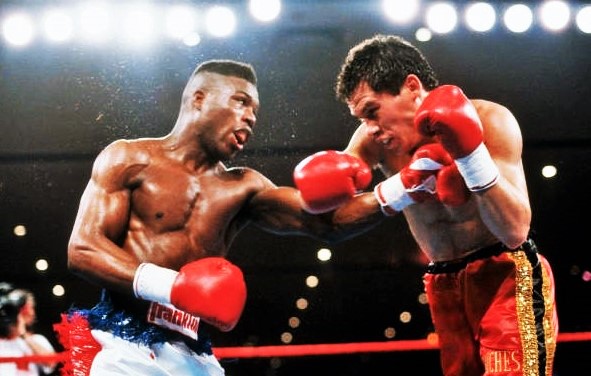
Thus, the Vegas hype machine ran full steam, taking advantage of fight fans’ rediscovered interest in the lower weight classes after Mike Tyson’s shocking loss to Buster Douglas. At the same time, media south of the Rio Grande patriotically swept away any pretense of objectivity as they fully backed Chavez, all Mexicans united behind their hero. While the bout did not transcend the sport and impinge on the larger culture — boxing having begun its slow fade from mainstream popularity — it definitely was the fight to see for all boxing fans. Jim Lampley called it “the greatest little fight money can buy,” a rare clash between great boxers in their primes. It was destined to profoundly alter the two warriors who fought it and leave an indelible mark on the sport itself.
From the opening bell the battle was waged at a furious pace, with Taylor– in full use of his outstanding boxing faculties and remarkable physical attributes — largely dictating the terms, scoring with lightning-fast combinations. Displaying tremendous conditioning, the Olympian threw piercing flurries with the firing frequency of a machine gun, determined as he was to keep the stalking, relentless Chavez at the end of his punches.
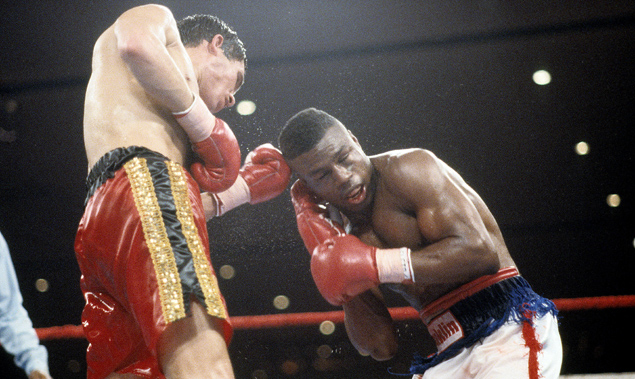
All this made it difficult for “El Cesar del Boxeo” to assert his infighting strategy and bring his power to bear on Taylor’s ribs and spleen. The Sonora native chased after the Olympian, but failed to mount a sustained attack, instead settling for landing one punch at a time. Undeterred, Chavez took what he could get in the hopes of eventually corralling Taylor and trading shots on the inside, the comfortable office in which he always preferred to do business.
But Meldrick was a scoring machine, and the number of clean shots he landed would have severely dented the armour of any other foe. But while Taylor outscored Chavez by a wide margin, the Mexican’s chin proved as tough as advertised and he endured the Philadelphian’s punches stoically: slipping a few, rolling with others, but never pausing in his quest to close the distance. It took several rounds before he did so, but in the meantime, he made the most of each blow he could land.
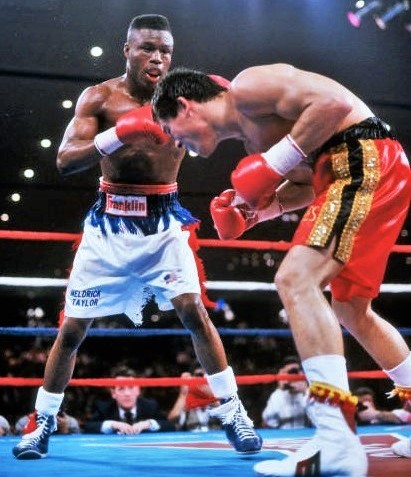
It was largely believed that the outcome of the contest would rest on the answers to two questions: would Chavez be able to land enough body blows to cut Taylor’s speed? And would the confident Taylor restrain himself from engaging in an all-out brawl? The questions, and their answers, were inextricably linked. Had Taylor opted to box from a distance, scoring with quick combinations before moving out of harm’s way, a winning outcome would’ve been virtually guaranteed. But Taylor had always been a warrior, a brave battler who had to be chased out of the sparring ring by his trainers. The quintessential “Philly fighter,” he loved to rumble and he was driven now by a desire to both honour the City of Brotherly Love and to beat the tough Chavez at his own game.
But the moments where Meldrick bravely mixed it up were also the ones on which Chavez best capitalized. For evidence, watch the Mexican’s rally at the end of round two. As Taylor elected to trade, Julio consistently beat him to the punch, landing hard overhand rights and leveraged left hooks. In the fifth Taylor again granted Chavez the chance to fight inside, and even though he outscores the Mexican, Taylor’s puffed up eyes at round’s end showed who dished out the more telling blows. And yet, as the rounds sped by, there was no denying that more of them belonged to Taylor.
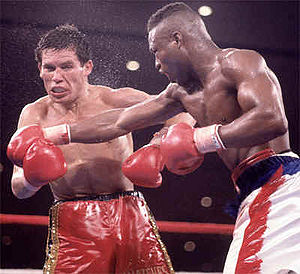
But in round ten a change in momentum was evident and the more pressure Chavez applied, the more Taylor chose to stand his ground, as a result not only of his courage, but also of his diminishing stamina. As Chavez’s attack mounted, the fight became a grueling war of attrition. The largely Mexican crowd–stirring itself into a frenzy–by now disdained their seats and cheered the bull-like Julio on. Rounds ten and eleven were the most furious of the fight and the most damaging for Taylor. As the two warriors returned to their corners with a mere three minutes to go, victory remained within reach for both. For Taylor, by decision; for Chavez if somehow, in the final round, he could cash in on the punishment he had mercilessly meted out in the last few rounds.
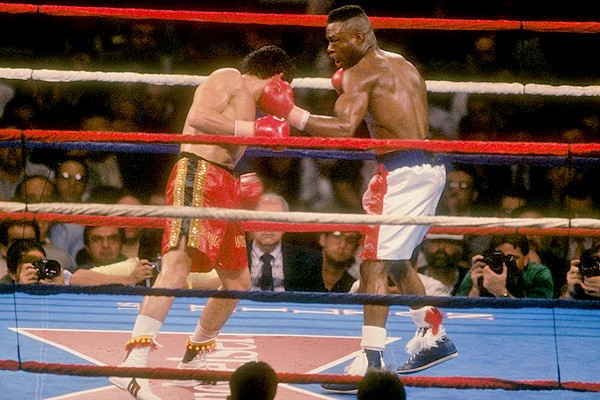
Then came the finale, a finish as dramatic and controversial as any in the long history of the sport. The sequence transpiring in the bout’s dying seconds was a direct result of the pounding Taylor had absorbed, punishment that left him with a broken orbital bone and made him urinate blood after the fight. While Meldrick’s corner must have known that Taylor held a sizable lead on the scorecards, and despite watching him spit blood and peer out from horribly swollen eyes, they inexplicably urged him to go after Chavez in the final round. Meanwhile Chavez’s corner knew they were fighting a losing battle and only a knockout could keep the Mexican’s undefeated record intact. Drama was all but guaranteed in the final chapter of an already epic battle.
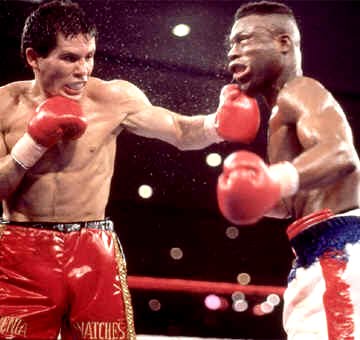
For the next two minutes and 58 seconds, an exhausted Taylor fought with the courage of a man drifting into a storm-ridden ocean who will do anything to stay afloat. With Chavez doggedly pursuing the knockout, Taylor, following his corner’s instructions, refused to yield ground, firing off flurries while exposing himself to further damage. With 25 seconds to go, a potent right cross sent Taylor backwards. Chavez caught up with his quarry, threw a combination but then backed off, setting a trap for Taylor who duly chased after him on uncertain legs. With just 18 seconds left, as Chavez finished off a combination, he moved away from the ropes and then swiftly turned to throw a crushing right hand that Taylor didn’t see. The shot sent the champion reeling to the canvas in his own corner, at the same time liberating from the throats of millions of Mexicans a long-held cry of joy.
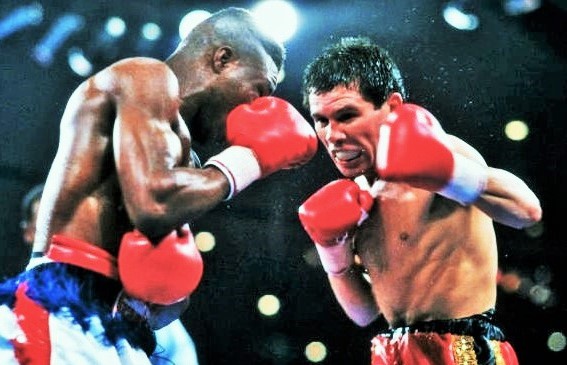
As the crowd lost its collective mind, Taylor’s arms searched for the ropes and referee Richard Steele counted. By six, Meldrick was vertical; at nine he looked to his corner, which was frantically yelling, either at Taylor or at Steele. Amid all the noise, and while quite possibly trying to ascertain what trainer Lou Duva was shouting, Taylor did not look at referee Steele as he asked the downed fighter if he was okay. Deciding the champion was no longer fit to continue, Steele waved his arms and ended the fight, granting Julio Cesar Chavez an incredible victory with just two seconds left on the clock.
Chavez vs Taylor I was universally deemed the Fight of the Year for 1990 and would later be called The Fight of the Decade by Ring magazine, and it’s hard to argue against either judgement. But for all the savage action and incredible courage on display, the bout will be forever stained by Richard Steele’s call, which unfairly robbed Taylor of the opportunity to finish on his feet and celebrate a clear points victory after an amazing performance.

Steele’s decision has been analyzed and discussed endlessly ever since but even now, after three decades, his actions merit consideration. First, there is no way Steele did not know that scant seconds remained before the final bell. Atop the ring post behind Taylor and facing Steele were blinking red lights counting down the final ten seconds of the round, and Steele’s assessment of Taylor’s condition and fitness to continue, unduly brisk, appeared influenced by this fact. Having completed the mandatory eight count, Steele quickly asked “Are you okay?” twice, without first getting Taylor’s attention or, in the second instance, even giving Taylor any chance to reply. He then immediately waved the fight off.
Steele’s actions, which unfortunately determined the outcome more than any punches landed by Chavez, including the right hand which decked Taylor, were, strictly speaking, in line with refereeing procedure, while at the same time, breaking with tradition in terms of giving a champion boxer who has beaten the count with time to spare a chance to redeem himself. Examples of the latter abound: think Jack Dempsey vs Luis Firpo, Juan Manuel Marquez vs Manny Pacquiao I, Larry Holmes vs Renaldo Snipes.
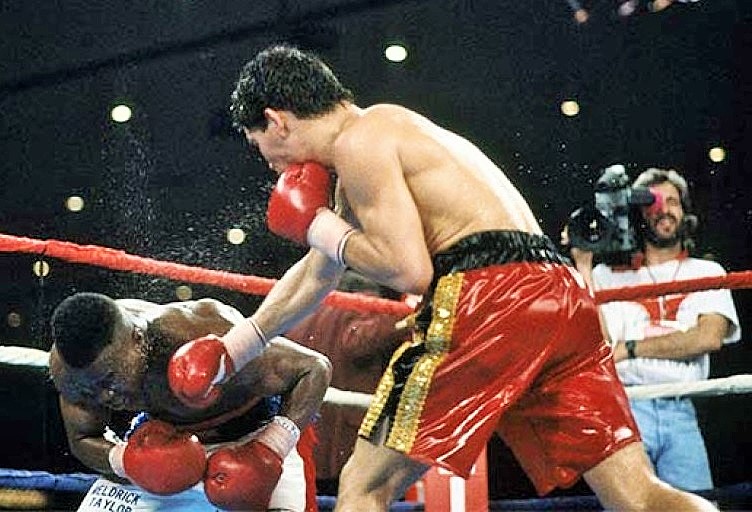
To further illustrate, had Richard Steele been the referee, there’s no chance the great Archie Moore would have made it out of the opening round to defeat Yvon Durelle in their fabled first fight. In any case, if any champion deserved a thoughtful evaluation from a referee, it was Taylor, and had Steele taken two seconds to wipe off Meldrck’s gloves or have him take a step forward as he continued to assess him, the bout would have ended before he had to make a decision.
Finally, consider Steele allowing Thomas Hearns to continue after getting decked in his first fight against Iran Barkley in 1988. Hearns barely beat the count and was clearly out on his feet and yet, without responding to any questions, he was still given a final chance to compete before Barkley knocked him out of the ring. Had Steele used the same standard for Meldrick Taylor, decades later boxing fans would be able to appreciate this great fight and the inspiring performances of both combatants without having to include the referee in the discussion.
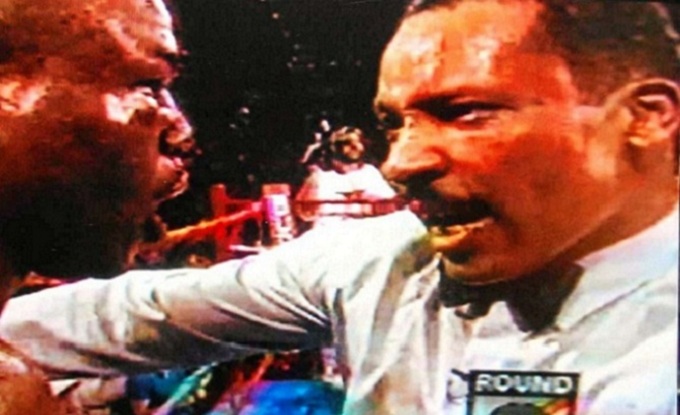
It’s been said before, but that doesn’t make it any less true: those twelve brutal rounds of combat irreversibly changed the lives of Chavez and Taylor. After this heartbreaking defeat, Meldrick was never the same dazzling, lightning-quick phenom who could box circles around his opponent. He would win another world title before eventually losing to Terry Norris and Crisanto Espana, continuing to compete until 2002, despite his loss of reflexes and speed, and, tragically, the noticeable slurring of his speech.
But that first battle with Taylor also marks the birth of the suspicion that the career of Julio Cesar Chavez had become a script dictated by powers greater than he possessed in his fists. Future chapters—including the outrageous draw verdict in a fight he clearly lost to Pernell Whitaker—would only add fuel to the speculation. But on that truly legendary night in Las Vegas, Chavez brought a whole nation to its feet with one crushing right hand, and Richard Steele made a truly regrettable call that stole victory from a warrior who left a piece of his soul in the ring. It’s a moment that will live on in the collective mind of boxing fans long beyond our lifetimes, for all kinds of reasons, both good and bad. –Rafael Garcia











